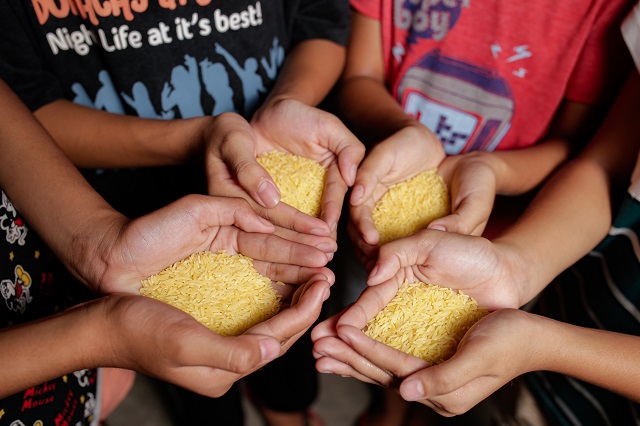By Eufemio T. Rasco

Understanding the science behind food is more important than ever.
As the Philippines slowly loosens its COVID-19 protocols, it has become necessary to address other important issues that emerged, or were exacerbated, during our extended lockdown.
This is particularly resonant for the Philippine agriculture sector, which is undergoing a shift from the perspective of its food systems. This is in part due to shifting global paradigms and commitments made concrete in the United Nations Food Systems Summit held in September, which recognized the role that biotechnology and other scientific innovations play in meeting the U.N.’s sustainable development goal 2: zero hunger.
According to the U.N.’s Food and Agriculture Organization, in its “The State of Food Security and Nutrition in the World 2021,” over 45% of the Philippine population were considered moderate-to-severely food insecure from 2018 to 2020, 4% higher than the previously recorded data.
Higher prices, due to gaps in the farm-to-market chain, coupled with reduced incomes, meant that households had to cut down on the quantity and quality of their daily food consumption. This was keenly felt in urban areas like Metro Manila, which rely on nearby provinces for their food supply.
Throughout all of this, rice remained a constant part of the public conversation and the Filipino diet.
As much as rice continues to be a preferred staple for Filipino consumers and is a good source of calories, it does not contain the micronutrients needed to maintain good health and a functional immune system.
On the other hand, the supply and safety of eggplant — one of the country’s most popular vegetables and an important element in a balanced Filipino diet — are constantly under threat from an insect pest that has eluded conventional control measures and costs farmers up to 70% in economic losses and to their health through their constant exposure to toxic pesticides.
It is for the reasons that we at the National Academy of Science and Technology (NAST) initiated and continue to advocate for a shift in the food system paradigm in the Philippines.
In 2019, we led the development of a food systems vision for Metro Manila that aims to shift behaviors toward the adoption of sustainable healthy diets while taking into account farming livelihoods, consumer needs and preferences, and environmental concerns.
While diet diversity is the ultimate goal of our vision, we recognize that rice consumption can only be reduced but not wholly eliminated. On the other hand, supply of affordable and safe eggplant needs to be assured.
Fortunately, two projects of the Philippine agri-biotechnology community are Golden Rice and Bacillus thuringiensis, or Bt, eggplant, which were recently granted approval for commercial propagation and direct use as food, feed, or for processing, respectively, by Bureau of Plant Industry, a government agency under the Department of Agriculture.
This makes the Philippines the first country in the world to approve a genetically modified rice variety specifically developed as a complementary nutrition intervention and the second country to affirm the food safety of a genetically modified eggplant after Bangladesh.
But much needs to be done. While the Philippines has long been a trailblazer in agricultural biotechnology in the Southeast Asian region, concerns remain regarding the impact of biotechnology on food that need to be addressed, especially perceptions regarding its safety and affordability.
Philippine Agriculture Secretary William Dar is quite right when he says that a significant effort must be made to win over skeptics, and to give our people the capacity to understand the science behind the food, and to make meaningful decisions regarding their health and livelihood.
This is a challenge that we in the scientific community must step up to. NAST, which is mandated to advise the Philippine government and the public on matters of scientific importance, recently released a statement of support on genetically modified organisms (GMOs), specifically for Golden Rice and Bt eggplant.
“The preponderance of evidence about the safety of GMOs from eminent scientific bodies and government regulatory agencies globally gives us the confidence to assure the Filipino public that we can safely plant and consume both Bt eggplant and Golden Rice,” said our statement, in part.
Concerns about affordability, on the other hand, stem from the association of GMOs with big agricultural corporations.
While the private sector has developed all currently available GMO crops in the Philippine market, development of Golden Rice and Bt eggplant in the Philippines is led by public sector institutions: the Philippine Rice Research Institute in collaboration with the International Rice Research Institute, and the University of the Philippines-Los Banos Institute of Plant Breeding.
Conversations with the project team have assured us that steps are being undertaken to make the adoption of these new crops affordable and sustainable.
These include identifying high-yielding genetic backgrounds for breeding, establishing linkages with existing programs that work with target communities and continuously building an evidence base to strengthen existing data on the safety and potential impact of Golden Rice and Bt eggplant.
Engagement with key stakeholders from the national level down to the municipal level is necessary and will prove critical to community acceptance and adoption of these new crops.
This article was originally published at https://asia.nikkei.com/Opinion/Golden-Rice-is-a-Philippine-lifesaver.
Dr. Eufemio T. Rasco is a member of the National Academy of Science and Technology (NAST) of the Philippines and is chair of its agricultural sciences division. He is also a former executive director of the Department Agriculture-Philippine Rice Research Institute.




